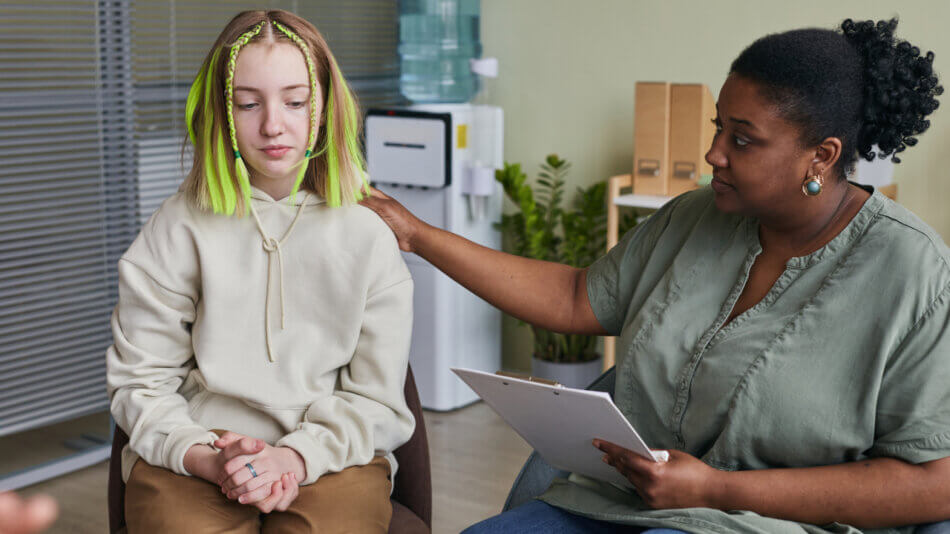If your teen is battling distorted perceptions of their body or struggling with low self-esteem, finding the right therapy for body image and self-esteem issues is a vital step toward recovery. Adolescents face intense pressure—from social media ideals to peer comparison—that can fuel negative self-talk and disordered eating behaviors. In this guide, you’ll learn about the causes of body image and self-esteem challenges, evidence-based treatment options, and how to connect with programs that accept insurance.
Adolescent treatment for eating and body image disorders often combines medical supervision, nutritional counseling, and specialized therapies. Early intervention can prevent restrictive, compulsive, or binge-eating patterns from escalating. This guide covers key approaches like cognitive behavioral therapy, dialectical behavior therapy, and family systems therapy, as well as complementary methods such as expressive arts and mindfulness practices.
Whether you’re just beginning to explore treatment or need to navigate insurance coverage, you’ll find clear, knowledgeable guidance to support your teen’s journey toward self-acceptance and healthier habits.
Understanding body image issues
Body image refers to how your teen perceives and feels about their physical appearance. When negative perceptions become persistent and distressing, they can lead to body image distortion—a condition in which teens see flaws that are exaggerated or nonexistent. This distortion often drives behaviors like excessive dieting, binge eating, or compulsive exercise (Counseling Center Group).
Body dysmorphic disorder (BDD) is a more severe form of body image distortion. It involves an intense obsession with perceived flaws that interferes with daily life, social interactions, and academic performance (Eating Disorder Hope). Teens with BDD might:
- Spend hours checking the mirror or comparing themselves to peers
- Avoid social events due to shame about their appearance
- Engage in excessive grooming or skin picking
Recognizing these signs early enables you to seek specialized support before habits become deeply ingrained.
Recognizing self-esteem challenges
Self-esteem shapes how your teen values themselves and influences their resilience to stress. Low self-esteem often co-occurs with disordered eating, creating a cycle where negative self-talk reinforces unhealthy behaviors. Counseling can improve self-esteem by helping teens reframe negative thoughts and build self-worth through empathetic, nonjudgmental guidance (Carlow University).
Common signs of low self-esteem in teens include:
- Persistent self-doubt and sensitivity to criticism
- Feelings of inferiority or social withdrawal
- Difficulty asserting needs or setting boundaries
- Co-occurring anxiety, depression, or irritability
Licensed professional counselor Shelby Turner highlights boundary-setting as a key skill for teens with low self-esteem, teaching them to assert physical and emotional limits in relationships (Counseling Today). Counselors also work to dismantle internalized core beliefs formed in early childhood, replacing self-criticism with self-compassion.
Implementing early intervention
Early intervention can stop mild body image and self-esteem issues from spiraling into severe eating disorders. When you notice warning signs—such as sudden weight changes, obsessive dieting, or secretive eating—prompt action is essential.
Begin with a compassionate conversation:
- Choose a calm, private setting.
- Use “I” statements, for example, “I’ve noticed you seem anxious after looking in the mirror.”
- Listen without judgment and reflect back what you hear.
- Acknowledge their feelings and validate how hard it is to talk about these topics.
After this discussion, seek a referral to a specialist. You might explore options like eating disorder counseling for teenagers, which combines clinical expertise with age-appropriate support. Early screening tools—such as the Rosenberg Self-Esteem Scale or the Eating Disorder Examination Questionnaire—can guide clinicians in developing a tailored treatment plan.
Medical and nutritional support
Therapy for body image and self-esteem issues should include medical and nutritional supervision. Eating disorders can lead to serious health risks, including electrolyte imbalances, cardiovascular issues, and bone density loss. A pediatrician or adolescent medicine specialist monitors vital signs, lab results, and overall wellness throughout treatment.
Registered dietitians provide nutritional therapy to restore balanced eating habits and teach your teen about healthy nutrition:
- Creating meal plans that meet caloric and micronutrient needs
- Gradually reintroducing “fear foods” in a supportive environment
- Teaching mindfulness around hunger and fullness cues
Programs such as an adolescent nutrition and therapy program integrate dietitians into the treatment team. In partial hospitalization or day treatment settings, supervised meals reinforce therapeutic goals. For example, many day treatment for eating disorders in teens combine meal support with group therapy to address both physical and emotional recovery.
Cognitive behavioral therapy
Cognitive behavioral therapy (CBT) is a leading evidence-based approach for treating body image concerns and low self-esteem. CBT helps your teen identify and challenge negative thought patterns, replacing them with balanced, realistic beliefs. Adolescent CBT programs typically run for 12 to 20 sessions and include goal setting, skill practice, and progress tracking (cogbtherapy.com).
Core CBT techniques include:
- Cognitive restructuring: Evaluating evidence for and against self-critical thoughts
- Exposure exercises: Confronting anxiety-provoking situations, such as trying on new clothing
- Behavioral activation: Encouraging activities that foster self-efficacy and positive mood
- Mindfulness training: Building present-moment awareness to interrupt rumination
For teens with restrictive patterns, specialized support like therapy for teens with restrictive eating patterns can be added. If your teen struggles with anorexia or bulimia, consider therapy for teen anorexia and bulimia to address the specific cognitive and behavioral features of those disorders.
Dialectical behavior therapy
Dialectical behavior therapy (DBT) teaches teens to manage intense emotions and build distress-tolerance skills. Originally designed for borderline personality disorder, DBT is effective for adolescents whose eating behaviors are driven by emotional dysregulation.
Key DBT skills
DBT centers on four skill modules:
- Mindfulness: Observing thoughts and feelings without judgment
- Distress tolerance: Coping with crises without harmful behaviors
- Emotion regulation: Identifying emotions and applying strategies to reduce vulnerability
- Interpersonal effectiveness: Communicating needs and setting healthy boundaries
How DBT helps teens
By mastering these skills, your teen can resist impulses to use food restriction or overeating as emotional coping tools. Therapists use role-play and homework assignments to reinforce skills in everyday scenarios. If emotional eating is a primary concern, complement DBT with therapy for teens with emotional eating.
Family systems therapy
Family systems therapy addresses eating and body image issues within the context of family relationships. Since teens rely on family for emotional support and modeling, involving caregivers enhances treatment outcomes.
Involving family members
In multi-family or single-family sessions you will:
- Explore communication patterns that contribute to body image stress
- Share feelings around food, weight, and self-worth
- Collaborate on meal support strategies to reduce mealtime tension
- Establish consistent boundaries that reinforce healthy habits
Benefits of family sessions
Therapy that includes your family can:
- Increase accountability through shared treatment goals
- Improve understanding of your teen’s emotional triggers
- Strengthen support systems at home
- Reduce isolation and foster teamwork in recovery
For programs specializing in family involvement, see family therapy for adolescent eating disorders.
Complementary therapy approaches
Complementary methods can enrich core therapies by engaging your teen in creative and mindful practices. A meta-analysis of stand-alone body image interventions reported moderate improvements in body image and large reductions in social comparison tendencies (PMC).
Expressive arts therapies
Art, music, or dance therapy provides nonverbal outlets for exploring emotions tied to body image and self-worth. Your teen might:
- Create self-portraits to challenge distorted perceptions
- Use movement to reconnect with their body
- Compose music or poetry to express complex feelings
Mindfulness-based therapies
Mindfulness practices—such as body scans, breathing exercises, or guided imagery—teach present-moment awareness and reduce self-judgment. Regular practice can ease anxiety and interrupt negative thought cycles.
Group therapy benefits
Group sessions focused on body image recovery normalize your teen’s experience and build peer support. In a group setting teens can:
- Share challenges without fear of judgment
- Practice interpersonal skills in a safe environment
- Witness and celebrate each other’s progress
For a holistic blend of these approaches, ask about holistic therapy for teens with eating concerns.
Navigating insurance and programs
Most insurance plans provide mental health benefits for eating disorders, but coverage details vary. Contact your insurer to confirm:
- In-network vs out-of-network providers
- Deductibles, co-pays, and out-of-pocket maximums
- Preauthorization requirements
- Session limits or day limits
Examples of covered settings
- Residential care: residential eating disorder recovery program for teens
- Day treatment: day treatment for eating disorders in teens
- PHP and IOP: teen eating disorder php and iop
Verify coverage with both your insurance provider and the program’s insurance coordinator to avoid surprises.
Taking next steps
Supporting your teen through therapy for body image and self-esteem issues involves preparation and partnership:
Finding the right program
- Identify your teen’s primary challenges—restrictive eating, binge or emotional eating, compulsive exercise
- Consult specialists based on those challenges—CBT for body image, DBT for emotional regulation, family systems therapy for relational support
- Review credentials, treatment philosophies, and success stories
- Seek referrals from pediatricians, school counselors, or trusted healthcare providers
Preparing for treatment
- Discuss program expectations and daily routines with your teen
- Arrange school absences, transportation, and sibling care
- Collect medical records, insurance details, and prior assessments
- Establish realistic goals in partnership with your teen and the treatment team
Taking decisive, informed action today helps your teen build a healthier relationship with their body and themselves. With the right mix of therapies, medical supervision, and family support, recovery is within reach.










